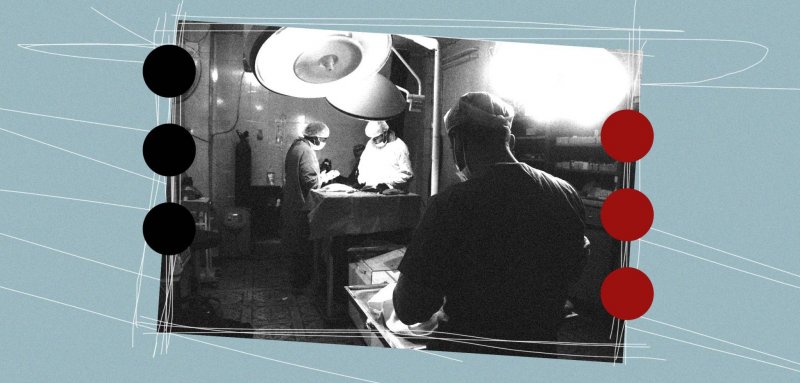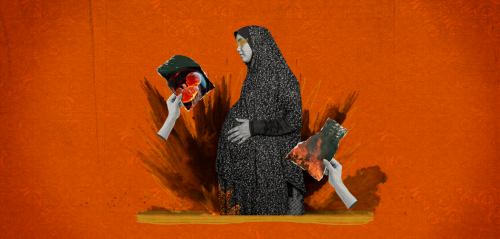 Not On The Margins Raseef22
Not On The Margins Raseef22
This report is part of the "Not on the Margins" project, which sheds light on freedoms, and sexual and reproductive health and rights in Lebanon and the Arab world.
In Iraq, women are subjected to a challenging journey against violence and marginalization, living under a patriarchal society that imposes strict restrictions and subjects them to various forms of oppression and discrimination. Within this challenging context, every step a woman takes towards state institutions becomes risky, and the healthcare sector is no exception to this grim reality.
The Numbeo index, which evaluates the living standards and quality of healthcare globally, ranked Iraq as the third-worst country in the world for primary healthcare. So, how does this affect women's reproductive health, particularly in government maternity hospitals?
Iraq's hospitals and healthcare facilities suffer from deteriorating infrastructure, a lack of modern medical equipment, and shortages of medications and supplies. Recently, the Numbeo index, which evaluates the living standards and quality of healthcare globally, ranked Iraq as the third-worst country in the world for primary healthcare. So, how does this affect women's reproductive health, particularly in government maternity hospitals?
Iraqi women face a horrifying phenomenon that many entities overlook: obstetric violence. Instead of providing a safe and supportive environment for pregnant women, hospitals become a scene for cruel and humiliating practices that leave behind deep physical and emotional scars.
This violence occurs in many forms, from verbal insults and degrading gestures to deliberate medical neglect and unnecessary cesarean sections, as well as physical assaults.
Iraqi women face a horrifying phenomenon that many entities in Iraq overlook: obstetric violence. Instead of providing a safe and supportive environment for pregnant women, hospitals become a scene for cruel and humiliating practices that leave behind deep physical and emotional scars. This violence occurs in many forms, from verbal insults and degrading gestures to deliberate medical neglect and unnecessary cesarean sections, as well as physical assaults.
The World Health Organization defines obstetric or childbirth violence as "a form of disrespectful and abusive treatment” that women experience during childbirth, including “neglect, sexual assault, denial of pain relief, outright physical abuse, profound humiliation and verbal abuse, coercive or unconsented medical procedures (including sterilization), lack of confidentiality, failure to get fully informed consent, refusal to give pain medication, gross violations of privacy, refusal of admission to health facilities, neglecting women during childbirth to suffer life-threatening, avoidable complications, and detention of women and their newborns in facilities after childbirth due to an inability to pay—actions that constitute a blatant violation of women's rights.”
According to the organization, the impact of this violence is not limited to physical harm; it also leaves deep psychological scars on women, potentially leading to mood disorders, anxiety, postpartum depression, and, in some cases, a complete refusal to go through childbirth again.
Verbal violence
In Iraq, verbal abuse from staff and nurses ranks first among the forms of violence women experience. This includes insults and curses directed at the mother if she forgets or is unable to bring her childbirth bag or baby supplies, fails to pay bribes to nurses, or screams too much in pain. This was the experience of 27-year-old Sarah al-Issa during the birth of her child at a public hospital in Basra.
In Iraq, verbal abuse from staff and nurses ranks first among the forms of violence women experience. This includes insults and curses directed at the mother if she forgets or is unable to bring her childbirth bag or baby supplies, fails to pay bribes to nurses, or screams too much in pain.
"I had never felt such humiliation as I did during the birth of my first child. I couldn't defend myself because my life was in their hands, and they were capable of harming me," Sarah tells Raseef22, recounting how she was insulted and scolded for forgetting to bring a necessary birth item—the baby swaddle.
Sarah explained, "I thought it was normal to be cursed and reprimanded because I wasn't the only one. I saw other women who gave birth the same day go through the same thing, though with different details. We were all taken into the delivery room with no regard for our privacy." Sarah recalled what one nurse said to her: "You didn’t forget to bring your lipstick, but you forgot to bring an extra swaddle? Mothers these days only know how to sleep and take selfies." The nurse then yelled at Sarah’s mother to hurry up and bring the spare supplies.
Ludia Rimon, 30, recounts accompanying her sister during a two-day stay at Ibn Ghazwan Hospital in Basra, southern Iraq. "My sister was in labor for 10 hours. She was about to give birth, but her cervix wasn’t dilating. Since the specialist doctor wasn’t present, no decision could be made about her condition or whether she needed a C-section. It was late at night, so the nurses kept yelling at her, saying things like, ‘Stop screaming, be quiet,’ and ‘You only know how to sleep with men?’ It was shocking for both me and her."
"What happens in delivery rooms is terrifying—verbal and physical assaults are common. The violence doesn't only come from nurses but also from specialized doctors. Verbal abuse often includes insults that violate the patient’s sexual privacy, such as ‘You could endure sex, but you can’t endure childbirth?' Women are also subjected to body shaming. They are bullied for their body shape and the color of their private areas. If a patient screams in pain, she might be physically assaulted, such as having her legs hit or being pinched in different parts of her body.”
Rimon said the absence of the specialist doctor delayed the decision about the type of delivery her sister needed. Since a C-section wasn’t possible due to the lack of a qualified doctor, the nurses resorted to an episiotomy, which is an incision in her perineum, the area between a woman’s vaginal opening and anus. The baby was born with severe cyanosis and was completely blue in color. It narrowly escaped death "by a miracle."
"‘You think marriage is just fun?’ and ‘Do you only know how to sleep with men?’ are just some of the phrases most women hear in the delivery room," Ludia explained, adding: "What’s even worse is the complete lack of privacy in the delivery room. Five or more women are brought in at once, and for those whose natural childbirth becomes difficult, they perform an episiotomy (cut her perineum) without consent and then stitch the wound without anesthesia."
Hospitals without specialists
In this case, as in many others, a nurse cannot make the decision to perform a surgical procedure. But where was the specialist doctor?
"‘You think marriage is just fun?’ and ‘Do you only know how to sleep with men?’ are just some of the phrases most women hear in the delivery room. Even worse is the complete lack of privacy in the delivery room, where five or more women are brought in at once. For those whose natural childbirth becomes difficult, they perform an episiotomy (cut her perineum) without consent and then stitch the wound without anesthesia."
Rafid Baqir, a resident doctor at a hospital under the Najaf Health Directorate, tells Raseef22: "Some deliveries take place without a specialist doctor present. This isn’t limited to delivery rooms; sometimes even the emergency department lacks specialists."
When asked why doctors are absent, Baqir explained, "There are frequent cases of doctors avoiding their shifts and neglecting work. They often rely on resident doctors as substitutes. In some cases, particularly during night shifts, the hospital is staffed only by nurses. In emergencies, they call the specialist doctor to describe the case over the phone, and the doctor decides whether they need to come to the hospital or not."
Nabaa Kamel, a 26-year-old nurse at Zahra Hospital in Wasit, justified obstetric violence to Raseef22, saying: "Some women don’t want to give birth naturally and ask for a cesarean, even though they’re capable of natural childbirth according to the specialist doctor. Others refuse an episiotomy, even when it’s medically necessary." She added that women "don’t have enough medical knowledge, so sometimes we yell to get them to listen. We know what’s best for them."
An episiotomy is a surgical procedure in which the tissue between the vagina and anus is cut during childbirth to make delivery easier. This practice is common among doctors but is highly controversial. According to the American College of Obstetricians and Gynecologists (ACOG), experts now recommend limiting the use of episiotomies and that it “should be done only when it is absolutely necessary.” Research shows that the procedure may increase the risk of severe tearing, rectal incontinence, and/or chronic pain.” Additionally, studies have not shown that episiotomies improve childbirth outcomes or postpartum recovery. A report by Doctors Without Borders, or Médecins Sans Frontières (MSF), also indicates that episiotomies are often unnecessary, since “simple first- and second-degree tears heal as well or better than an episiotomy.” It added that “should not be performed routinely,” as they can lead to complications such as “infection, hemorrhage, or chronic pain.”
Rampant corruption
It's not just about insults, lack of care, and loss of privacy; bribes paid to nurses and midwives are also part of the problem.
“Midwives refuse to provide information to the patient's companions about her health condition unless they are paid money, and 'if she pays money, they treat her well,'" says Yusr Mazen, 28, a reproductive health trainer in Wasit Governorate, central Iraq.
"I had never felt such humiliation as I did during the birth of my first child. I couldn't defend myself because my life was in their hands, and they were capable of harming me."
Mazen, who works at the Afaq Foundation for Women's Support, says that through her work, she has come across many stories of women who experienced obstetric violence in Iraqi public hospitals.
She tells Raseef22 about the extent of corruption prevalent in public hospitals: “Families of patients give financial sums to the staff, who wear blue paper uniforms and work in cleaning or assisting patients. These amounts range from three to twenty US dollars. Midwives receive larger sums, which can reach up to eighty dollars, in exchange for helping the pregnant woman and treating her kindly in the delivery room. Although these practices are considered legal violations, patients and their families quietly pay these amounts to avoid potential mistreatment or to ensure they receive good care.”
Mazen adds, “The bribe isn’t called by its name in the hospital, but is referred to as ‘bshara’, or 'birth tip'. A nurse will come out of the operating room, approach the patient’s family, and ask for the 'birth tip’ for the good news.”
“Midwives refuse to provide information to the patient's companions about her health condition unless they are paid money, and if she pays, they treat her well. Families of patients must also give financial sums to the staff and nurses. Although these practices are considered legal violations, patients and their families quietly pay these amounts to avoid potential mistreatment or to ensure they receive good care.”
According to Mazen, these practices are less common in private hospitals, where there is continuous oversight, and penalties are imposed on those who demand bribes. Women also pay significant amounts to receive good care in these hospitals. Nevertheless, bribery and mistreatment are not entirely absent in private hospitals, but such practices are far less frequent compared to public hospitals.
Undocumented complaints
"What happens in delivery rooms is terrifying—verbal and physical assaults are common. The violence doesn't only come from nurses but also from specialized doctors. Verbal abuse often includes insults that violate the patient’s sexual privacy, such as ‘You could endure sex, but you can’t endure childbirth?' Women are also subjected to body shaming. They are bullied for their body shape and the color of their private areas. If a patient screams in pain, she might be physically assaulted, such as having her legs hit or being pinched in different parts of her body," said the deputy director of a maternity hospital in Diyala province, who wished to remain anonymous, in response to complaints he had received.
When asked how these complaints are handled, he replied: "It never reaches written complaints. Women refuse to take strict action against the nurses and midwives who mistreated them. Despite my constant efforts to convince them, they prefer to complain and talk without taking official measures, fearing their names will be mentioned, the cases will reach the courts, and they will have to speak about private and sensitive matters in our conservative society.”
"My sister was in labor for 10 hours. She was about to give birth, but her cervix wasn’t dilating. Since the specialist doctor wasn’t present, no decision could be made about her condition or whether she needed a C-section. The nurses resorted to performing an episiotomy, which is an incision in her perineum. It was late at night, so the nurses kept yelling at her, saying things like, ‘Stop screaming, be quiet,’ and ‘You only know how to sleep with men?’ It was shocking for both me and her."
The doctor concludes by saying, "Obstetric violence is not just a passing phenomenon; it reflects a deeper culture of discrimination and neglect that prevails in many healthcare institutions. There is still a long way to go to achieve a safe and just healthcare environment for women in Iraq."
Raseef22 is a not for profit entity. Our focus is on quality journalism. Every contribution to the NasRaseef membership goes directly towards journalism production. We stand independent, not accepting corporate sponsorships, sponsored content or political funding.
Support our mission to keep Raseef22 available to all readers by clicking here!
Interested in writing with us? Check our pitch process here!







